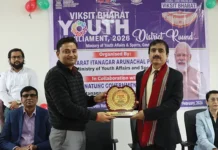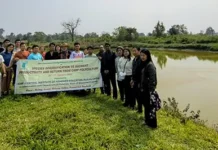[ Yangki Modi ]
As was recently reported in The Arunachal Times (‘Sino-India geopolitical tension affecting scientific community’, 15 November, 2023), a team of Indian scientists was recently subjected to a vicious attack of bullying by a Chinese-sponsored academic journal.
Dr Mukesh Thakur and his colleagues at the Zoological Survey of India (ZSI) had submitted a scientific paper which reported on the discovery of a new variety of macaque to the prestigious international journal, Wildlife Letters. It was peer-reviewed by an international panel and accepted for publication. However, soon after, it was forcibly retracted by the journal editors. Why?
Although the Wildlife Letters is published by Wiley – an American publisher that makes about Rs 200 crore in profits every year, and which has significant investments in India – this journal receives financial support from the Northeast Forestry University in Heilongjiang, China. As the editors told Dr Thakur, their journal is, therefore, “obligated to follow official Chinese maps and use of place names.” The “problem” that caused retraction of Dr Thakur’s paper was that it mentioned
that its study took place in Dibang Valley and West Siang districts of the Indian state of Arunachal Pradesh.
Retraction of a scientific paper is an extremely serious matter. Retractions happen when an author is found to have falsified data, or lied about their findings, or otherwise committed illegal activities or ethical abuses. Scientists whose papers are retracted can be disciplined, lose their jobs, or have their careers destroyed. But let us be very clear about what is happening here: Dr Thakur’s paper was retracted by the Wildlife Letters because he told the truth.
To his credit, Dr Thakur is not giving up. He has refused to change his paper, refused to lie, and refused to give in to bullying by these journal editors and publishers who have been evidently bought off by the People’s Republic of China.
As people of Arunachal Pradesh, we must support Dr Thakur and demand that his paper be reinstated. Because this attack is not only on Dr Thakur; it is an attack on the core principle of science, which is to tell the truth. It is also an attack on the idea of India, and on the Indian state of Arunachal Pradesh. However, more than anything else, this false and vicious forced retraction by the editors of the Wildlife Letters is an attack on the people of Arunachal Pradesh – it is an attempt to erase us, our places, and our voices from the face of the Earth, as if we did not exist and our places like Dibang Valley and West Siang were actually full of Chinese people speaking Mandarin.
We need to understand that this attack and others like it is exactly the strategy of the People’s Republic of China: to fill the world’s media with lies and uncertainty, to sow confusion and doubt. Unlike other nations, China’s approach is distinct; it thrives on maintaining uncertainty as a psychological weapon, perpetuating a threat to peaceful coexistence without actively addressing or resolving the underlying issues. This strategy appears to be at the core of their nation’s long-term goals, evident in various geopolitical matters such as the Indo-China border, the Korean peninsula, the South China Sea, and more. By perpetuating a myth that Arunachal Pradesh is a “disputed area,” an area which is “claimed by both India and China,” they fill the world’s thoughts with false ideas that there are “two sides” to this story – a Chinese version and an Indian version. Like all bullies, the Chinese choose targets they think will be weak, gaining millions of slow, easy victories, until their views become so widespread that the truth gets lost in the noise.
The bullying tactics employed by the Chinese government concerning Arunachal Pradesh align with their long-term goals. Despite lacking any evidence, they persistently make outrageous claims, finding satisfaction each time the issue arises. This constitutes a long-term psychological strategy aimed at altering the narrative surrounding the very existence of Arunachal Pradesh. This is the most pressing concern – the continuous portrayal of Arunachal Pradesh as a “disputed territory,” a blatantly false characterisation that, over time, the Chinese government aims to cement in the global narrative. It’s crucial to assert that Arunachal Pradesh is not a “disputed territory,” and this fact should be recognised and upheld by us and by anybody who writes about Arunachal Pradesh.
Because let us be very clear about this: there is one truth about Arunachal Pradesh, and that is the truth that is lived and experienced by its people. We are not a part of China. We are not now a part of China, we have never been a part of China, and we will never be a part of China. We walk out the doors of our houses, and we are in Dibang Valley. We are in West Siang. We speak and hear our own languages, which are the languages of India. As indigenous people of Arunachal Pradesh, it is crucial that we stand firm in presenting this truth about who we are and our histories. We must unequivocally communicate to the world that the land and the people of Arunachal Pradesh have never been under any empire or sovereign entity that wielded any authority to claim our land and people. Our choice, made without any coercion, was to join the union of independent India, and that is why we are who we are today. This narrative is fundamental, and every generation of indigenous Arunachal Pradesh people should be aware of it and safeguard it with utmost dedication, considering it integral to our heritage and identity.
Retraction of a single scientific article might seem like a small matter in the grand scheme of things. But we ignore such “small” matters at our own peril. If the Chinese did not see the importance of small victories such as this, they would not go to so much trouble to control global media, to complain about dignitaries visiting our area, and to issue insulting “stapled visas” to our people when we assert our right to travel internationally like every other Indian citizen.
Let us not give them this victory so easily. Write to the editors of the Wildlife Letters, write to Wiley publishers, and tell them to respect science, respect the truth, and duly publish Dr Thakur’s paper, mentioning Arunachal Pradesh. And tell them what the whole world needs to understand, for once and for all. We are here. We are the people of Arunachal Pradesh. We are Indian, and this is our land, it is not the land of the Chinese government. We will not stay silent and we will not go away. (The writer is a member of the Adi Milang tribe of Arunachal Pradesh and a research fellow at the University of Sydney, Australia)




